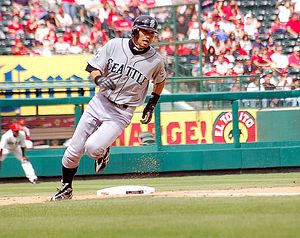Ichiro Suzuki, known to baseball fans simply as “Ichiro!”, will likely exceed 3,000 Major League Baseball (MLB) hits sometime this week. Ichiro currently sits at 2996, the product of a fantastic age 42 season in which the veteran outfielder is hitting .339.
The first Japanese position player to appear in the majors, Ichiro made his debut in 2001 with the Seattle Mariners. He helped lead that Mariners team to an astonishing 116-46 record, winning the Rookie of the Year and Most Valuable Player awards along the way. Ichiro remained consistently successful until about 2010, after which his skills began to decay and he took on more of a role player role. He joined the New York Yankees in 2012, and the Miami Marlins (his current team) in 2015. Ichiro plays with a distinctive style that produces a high batting average at the expense of walks and home runs. He is also generally regarded as a good defensive outfielder.
As Ichiro has approached 3,000 American hits, students of the game have inevitably begun to invoke a comparison to Pete Rose, the all-time MLB hit leader with 4,256. The comparison took on a sharp tone when Ichiro passed Rose in combined Japanese-American hits earlier this season, leading Rose to dismiss Ichiro’s achievements in Japan.
In fairness to Rose, had Ichiro came up in U.S. baseball he likely would have debuted later, and played against stronger competition. Thus, he would have had fewer hits; one analysis estimates between 850-950 for an imaginary MLB career before 2001. This would have left Ichiro well short of Rose, although still firmly in third place all time. In fairness to Ichiro, however, Rose wrote himself into the lineup at first base in his last three seasons (as player-manager), giving him the chance to get nearly 200 hits after he probably should have stopped playing baseball. Moreover, the reluctance of American teams to acquire Japanese position players carried more than a whiff of racism in the late 1990s, after it became clear that Japanese pitchers could succeed in the Majors.
But the numbers don’t tell the whole story. Pete Rose was widely disliked by other players, while Ichiro appears to be beloved of nearly everyone in and around the majors. More to the point, Rose disgraced himself (and received a permanent ban from the game) for betting on baseball; Ichiro remains free of any noticeable taint. These factors have led some to argue that Ichiro, rather than Rose, should hold the informal title of all-time “Hit King.”
That debate will never be resolved. Nevertheless, Ichiro remains one of the most popular baseball players in the world, and will undoubtedly enter the National Baseball Hall of Fame in his first year of eligibility (five years after he retires). He paved the way for other Japanese position players (such as Hideki Matsui) to enter the Majors. He fully deserves his place in the firmament of baseball stars.

































